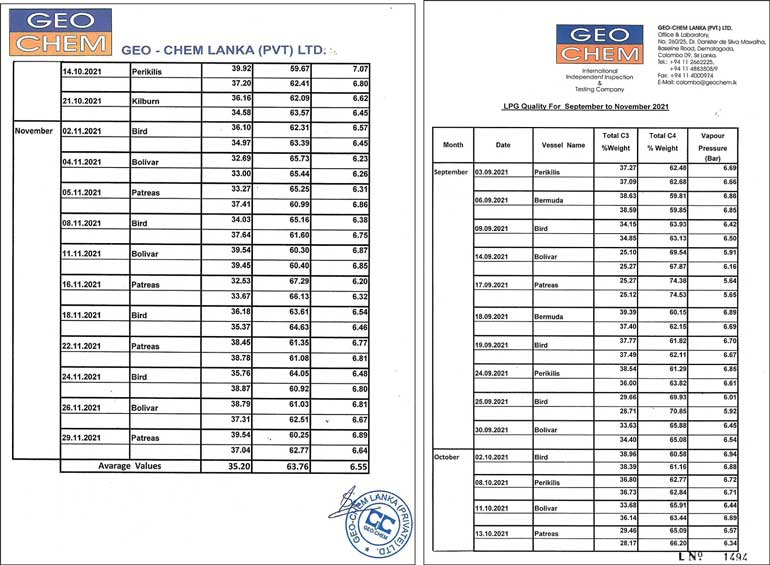Wednesday Feb 18, 2026
Wednesday Feb 18, 2026
Wednesday, 1 December 2021 00:15 - - {{hitsCtrl.values.hits}}

Litro Gas Lanka, the national LPG provider, reiterates that the LPG brought into Sri Lanka meets internationally-ratified compositions of propane and butane, certified at the point of loading and unloading.
The company assures that the LPG that is loaded on to the ship at supplier point is unloaded at Kerawalapitiya and stored in LPG storage spheres, after which point, cylinders of varied sizes are filled in the factory. The entire process, which is done under strictest safety standards, does not involve any tampering in Sri Lanka, while LPG is stored and filled into cylinders with the same specifications they have been shipped with.
“The LPG shipped by Litro Gas Lanka undergoes vigorous testing at point of loading and unloading in Kerawalapitiya; additionally, we obtain independently-verified and certified reports on the LPG composition from ‘Geochem’, an independent energy and LPG verification agency,” says Litro Gas Terminals Director – Operations Pushpakumara Edirisinghe.
“These standards have been internationally accepted and further approved by the Cabinet of Ministers through a tender process. For over five years, these standards have been maintained for every shipment of LPG to Litro Gas Lanka.”
Litro Gas Lanka says that the company possesses 8,000 MT LPG capacity, which means that a new LPG stock is required every six to seven days to meet the market demand. A new shipment of LPG arrives at the Kerawalapitiya filling plant every three to four days, ensuring that customers are given a seamless supply of LPG.
Although the company introduced the 18-litre cylinder earlier this year, it was soon taken off the market by a government directive and is no longer available in the market since June 2021.
Concerning safety, which forms a vital component in handling LPG, Litro Gas Lanka Channel Safety Advisor Hemachandra Gunathilake states that the globally accepted best practices should be deployed at all times when handling LPG for cooking or for any other purpose.
This means checking the hose, the regulator, the cooker and the connecting system which includes the safety clip of the cylinder.
“If there are any LPG leaks, it is detectable with the smell and visibility – additionally, the only correct method of checking for leaks is when the entire system is connected and observed.”
While advising consumers to refrain from resorting to unverified methods such as a soap test to determine leaks, Litro Gas Lanka points out that the correct safety protocols must be followed at all times when using LPG, and if there is indeed an emergency, ‘1311’ must be contacted to help understand the situation and mitigate it.
The company points out that in all instances where customers have complained about possible LPG leaks, the compromising of safety has taken place as a result of broken or damaged hose, regulator or the cooker.
“All of these devices must be checked and replaced regularly to ensure best possible safety performance,” he adds.
He further adds that the hose must be changed every two years and the regulator every five years.
For over 150 years, Litro Gas, as the national LPG provider, has played a key role in the country’s energy sector with a 75% market share and a network of 42 distributors, over 14,000 points-of-sale, 1,500 home delivery hubs and a customer hotline 1311 for a consistent supply of LPG throughout Sri Lanka.